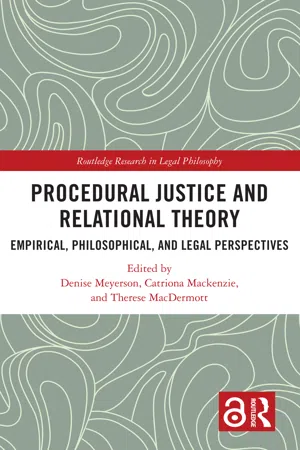Procedural justice in policing refers to the quality of the interpersonal treatment people receive from police and the fairness of the procedures police use to make decisions (see Tyler 1990, p. 7). Tyler (1990, p. 7) noted that four key elements are required for a police–citizen interaction to be considered as procedurally just. These four elements are: trustworthiness; respectful treatment; neutrality; and voice. A police officer who displays sincerity in being helpful, honest and open, and who acts consistently and in the best interests of citizens is an officer who will be viewed as trustworthy. Respectful treatment refers to police behaviour that displays respect for people’s rights and exemplifies dignified and polite treatment. People are particularly sensitive to signs that they are being treated respectfully by police, and they respond very negatively to signs of rude behaviour. In fact, rude behaviour from police typically attracts the largest number of citizen complaints in Australia each year (Porter & Prenzler 2017, p. 874). Police convey neutrality when they treat all individuals and groups in the community equally, and refrain from acting on biases or pre-existing views about people when making decisions. The over- or under-policing of certain communities can be perceived as police not providing neutral treatment across society (Tyler & Wakslak 2004, p. 254). Finally, voice refers to the ability of citizens to have a say in a situation that involves them. Having the opportunity to air a concern or explain one’s side of the story to a police officer before a decision is made, and being genuinely listened to, are indicators of procedural justice. Being consulted in police decision-making processes also constitutes an important element of voice. For example, research on Muslim communities shows that the provision of voice is an extremely important feature of Muslims’ interactions with police in counter-terrorism. A major criticism that Muslims have of police engagement efforts is that police do little in the way of consulting Muslims or involving Muslims in genuine discussions about how radicalisation in the Muslim community should be dealt with (Cherney & Murphy 2016, p. 491).
1.2.1 Deterrence versus procedural justice?
Policing is grounded on a deterrence-based model of crime control, where the focus is on detecting and apprehending lawbreakers (Mazerolle et al. 2014, p. 57). A deterrence-based model of policing assumes that people are rational actors who will be deterred from disobeying police or breaking the law because the consequences of being non-compliant will be detrimental to their welfare. In other words, people weigh up the costs and benefits of obeying police or the law. If the perceived costs of non-compliance outweigh the perceived benefits, then compliance will be the rational choice. A deterrence-based model assumes that police can best promote law-abiding behaviour through displaying power, effective enforcement and creating severe sanctions for non-compliance (Nagin 2013, pp. 205–206).
The problem with a deterrence-based policing approach, however, is it cannot explain why people still comply with police and the law when there is little chance of being detected breaking the law or when sanctions for non-compliance are minimal (Murphy, Bradford & Jackson 2015, p. 103). It also cannot explain why contact with the criminal justice system can increase re-offending. Anwar and Loughran (2011, p. 673), for example, noted that persistent offenders respond differently to deterrence. They showed that serious offenders reported being less concerned with sanction risk when compared to less persistent offenders. Deterrence perspectives are particularly problematic when explaining discretionary forms of law-related behaviour. Discretionary law-related behaviours include contacting police to report a crime or victimisation, or assisting police in crime prevention activities. Discretionary law-related behaviours are essential to the effective operation of the criminal justice system. Without such forms of behaviour, crimes would not be identified, witnesses would not come forward to provide evidence, and police would be unable to work with communities to promote and maintain order. Deciding not to engage in these behaviours will not—in most cases—result in a sanction. Yet most people engage willingly in these types of discretionary behaviour. At the same time, research with marginalised groups (e.g. crime victims, racial/ethnic minorities, those living in high crime neighbourhoods) finds these groups often avoid contact with police even in times of need (e.g. Murphy & Barkworth 2014, p. 178). Using the threat of punishment with individuals who do not engage in discretionary activities is likely to exacerbate disengagement.
Procedural justice scholars have therefore responded to the limitations of deterrence-based policing by arguing that most people cooperate and comply with legal authorities and laws because they believe it is right to do so, not because they fear the consequences of doing otherwise. For discretionary forms of law-abiding behaviour, procedural justice scholars suggest that concerns about fair treatment and respect are likely to be particularly salient in motivating people’s decisions to engage with police.
According to the procedural justice perspective, law-related behaviour is driven by normative and relational concerns, not instrumental concerns. Here, people cooperate and comply because they believe in the legitimacy of police and believe police and laws are entitled to be obeyed. In other words, the procedural justice perspective is underpinned by the normative assumption that authorities who treat people fairly have earned their rightful position to govern others, are entitled to be regarded as legitimate and have the right to request law-abiding behaviour from citizens (e.g. Hinds & Murphy 2007, p. 27). Studies demonstrate that an authority’s legitimacy can be damaged when an authority behaves badly. An authority that abuses its power or treats its citizens poorly will be distrusted by the community, resulting in an unwillingness of citizens to volunteer information, or to cooperate or comply with the authority and its laws (e.g. Murphy, Mazerolle & Bennett 2014, p. 408).
